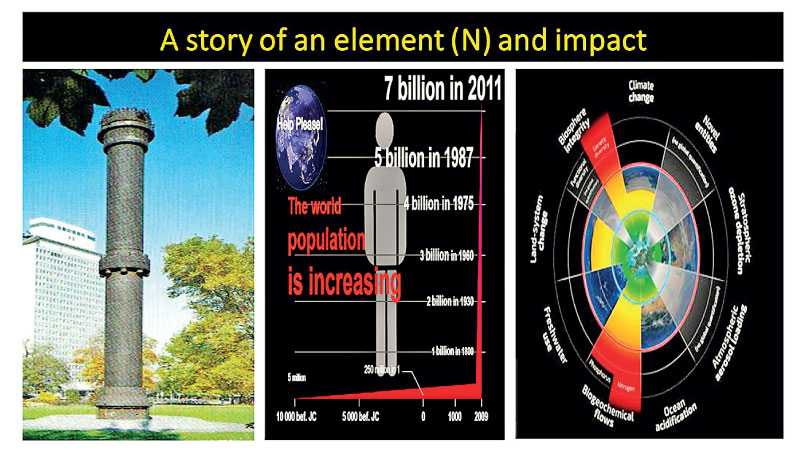Monday Feb 16, 2026
Monday Feb 16, 2026
Thursday, 20 May 2021 00:00 - - {{hitsCtrl.values.hits}}

Green chemistry in innovations

Spearheaded by Sri Lanka, UN Member states endorsed a proposed roadmap for action on nitrogen challenges called the Colombo Declaration on Sustainable Nitrogen Management
 Sri Lanka appears to be discussing something quite big without knowing very much about it. It all revolves around something quite common in the air we breathe though that part of the air is not doing us any good or bad.
Sri Lanka appears to be discussing something quite big without knowing very much about it. It all revolves around something quite common in the air we breathe though that part of the air is not doing us any good or bad.
One thing is for sure. The presence of that element, nitrogen, in that quantity is surely preventing the world from going up in flames. Certainly no laughing matter and the funny thing is nitrogen can turn into laughing gas when we mismanage this resource and the ensuing warming could kill us. We may not have much of a clue about any of these ramifications.
I know what I am today is thanks to nitrogen. My DNA and everyone else’s as well as RNA of the SARS-Cov-2 is critically supported by nitrogen. Nitrogen bases play a major role as building block of both DNA and RNA. Nitrogen undeniably thus is a critically important component of life. Nitrogen is similarly critical in food production and food sustains life and is a clear indicator that decisions with respect to nitrogen should not be made in haste!
Double-edged nature
As a chemical engineer I can state that no chemical engineering feat better illustrates the double-edged nature of many inventions than the Haber-Bosch process of taking nitrogen from the air and converting it to ammonia. The process was developed by the industrial chemist Fritz Haber and scaled up by the chemical engineer Carl Bosch and interestingly 100 years later the process still stands without change!
Why double-edged? While this ammonia supported fertiliser and food production and continued to feed billions it also supported the explosives industry. It has been indicated that if not for the Haber-Bosch process World War I would have finished much earlier because there would not have been sufficient explosives produced! Today we are looking at ammonia as part of an energy system. When what was in the atmospheric air was captured through high pressure machinery and few supportive chemicals, humanity was pushed into a new trajectory. We in chemical engineering consider this development as one of profession’s greatest achievements.
These days another process which was listed for IChemE (Institute of Chemical Engineers) UK honours is beckoning us and that is the cryogenic separations of gasses of Linde. Oxygen is one product of this process and the virus is taunting some economies with their inabilities to scavenge oxygen from air in required quantities.
Currently removing nitrogen and oxygen from air is giving us enough headaches. On the other hand, our pushing of combustion products like carbon dioxide to the same air which anyway initially has only minute quantities is also giving us another big headache – global warming.
Managing nitrogen
Though the impact of nitrogen pollution when in association with oxygen has been known, we always considered the carbon-based pollution to be more dominant and lots of hot air additionally has been created discussing the issue. Yet nitrogen is also contributing to the same problem and global warming is not thus uniquely from carbon and now we really must place nitrogen-driven pollution at the same level. Indeed, in 2019 a meeting in Colombo released a declaration now named as the Colombo Declaration and it dealt with managing nitrogen – Nitrogen for Life. Now nitrogen is on stage and with UN in the scene the governments across countries have to take due notice. The aim is to halve nitrogen waste by 2030. With the declaration giving free promotion to Colombo and Sri Lanka, even Sri Lankan Tourism may decide to do something on that.
Interestingly, as we pump sewage in one form or the other to the ocean around us especially from the main administrative capital Colombo and that means nitrogen mismanagement, the Tourist Board really should also be interested in pushing for mitigation and recovery as the declaration expects.
Food via new fertiliser
The story of the birth of a new fertiliser industry has roots in 2008 when Haber and Bosch started their work in Germany. The first high pressure reactor came on stream in 1913. For the first time atmospheric nitrogen was captured and reacting with hydrogen, ammonia was born.
The industry flourished and nitrogen in additional quantities were applied to soils and agriculture production went up. When the issue of food was getting resolved, the population too started increasing and this intensive fertilisation was able to meet increasing demands.
Yields were up. The BASF by placing the original reactor in front of their headquarters is acknowledging the contribution of a process to their growth and success. A monument with a meaning and so different from the usual caricatures we see in quite a few places.
Haber and Bosch were science and technology fusion of minds and both won Nobel Prizes. It has been indicated that we would only be able to produce around two-thirds the amount of food that we today if not for the Haber-Bosch process.
Organic fertiliser
If it was this process that has contributed to the feeding of billions, there is an interesting question. Can we go back to the past and still realise the yields to support the population of today? This is a question Sri Lanka too has to answer with its quest to move into organic fertiliser. There is certainly a call for an innovation here if we are to succeed in this endeavour.
There is no way without an innovation that we can succeed feeding the population by reducing the nitrogen input. However, a fact to be pointed out is that we have been overfeeding the land and nitrogen has been duly getting wasted. Benchmarking our practices with other countries demonstrates that.
Significant pollution has resulted from that, which is also a fact. That there are other nitrogen sources that are going begging too is a fact. There is certainly plenty of space for recalibration of our activities in this area. Science is less practiced but subsidies, trade practices and political point scoring have definitely stayed on top.
Going organic, I am sure the majority would be happy to accept. Multiple issues aligned to this situation with discussions on toxins of unimaginable proportions in our food every day surely gets the popular opinion to that side of the argument. The issue had been much of our arguments are targeting arousing emotional responses than enlightened behaviour. We were quite quick to close the only ammonia and urea plant that was developed too quickly with just looking at an emerging world market price and that was a mistake for which we are still paying a high price but not quite aware of.
Our ignorance in manufacturing is sad to watch and yet we may be looking to be one of the first countries in the world to have more produce with less nitrogen. While certainly the current practices are a significant burden to the economy in both acute and chronic formats, the path to take in alleviating this threat has to be different. A national roadmap with evidence-based milestones is a necessity.
Overstepping of planetary boundaries
The third part of the figure presented here indicates the research work of Johan Rockstrom, Stockholm Resilience Centre, which indicates among a few other issues that we have overstepped the planetary boundaries by way of using nitrogen. That is the essence of the drive towards nitrogen management as stated in the Colombo Declaration.
Issuing statements is not sufficient; the essence of it has to be understood. The overstepping of the planetary boundaries calls for action on multiple fronts including as you see in nitrogen and phosphorus management.
The Colombo Declaration is timely anyway and decision makers need to have much more understanding of the issue. The big transformation that we are talking about is in nitrogen circular economy and all these point to the power of the element and what we must do to alleviate a crisis.
Unfortunately, it is also a crisis which we know very little about and the first step to take is to be aware! Be really aware!